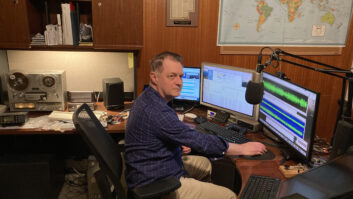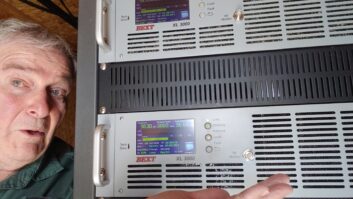A reader, an engineer who asked not to be named, emailed me to express the opinion that all the recent talk about AM “revitalization” wasn’t giving enough attention to interference caused by consumer electronics and other sources.
I sent him a link to the FCC NPRM, pointing out that there is some discussion of that topic there; he replies as you see below. I’m sharing this because of the intense interest in the overall question of AM’s future … and as always, I welcome your comments.
**
Paul, after you gave it to me, I read the FCC AM report; and yes they mention interference to the AM band — at the very beginning of the report in Section 2 background Paragraph 5.
That is that only mention. Nowhere do they talk about reducing the noise that plagues the AM and all bands below 30 MHz.
I talked recently with two knowledgeable people in the industry and they also ask the question I’m asking. One suggested maybe the FCC should look at its Part 15 rules and make them tighter.
So my question is: Why don’t they?
Why does a plasma TV have to generate so much interference? Why do CFL lights and wall-wart power supplies have to be noisemakers? Filter them better; it can’t raise the cost of the item by much.
I was told that there are two kind of light dimmers on the market — with and without RF suppression. Why don’t they all have RF suppression? I did some research on light dimmers made by one manufacturer; it seems the user is the one who must do the work and is “stuck” with getting rid of such interference. One emailed me to say their dimmers do have a built-in radio/TV filter but that if I’m still experiencing an issue, I should go to RadioShack and purchase a line noise filter for the radio.
Can you imagine an average “Joe” having to do this? He will simply stop listening.
If it is the nature of the product, maybe better suppression is needed in these devices.
How about PCs? I’ve seen PCs that generate much noise, and others that don’t. What is different about the ones that don’t generate heavy RF noise?
Again, years ago we were told to move the radio in our house to another area in the room if it suffered from interference. Why do I have to do that? Why can’t these interfering devices be made better so they don’t interfere? If I move the radio from one side of the room to another in today’s house, the radio ends up near another device that generates RF noise. Many devices in the home have microproccessors that generate noise. Frequencies below 30 MHz don’t have a chance in the home today.
Maybe the FCC has decided, because of lobbying by the electronics industry, that the frequencies below 30 MHz are useless. Why make a device that interferes better if you just meet present FCC regulations? And the electronic makers of today can do with they want because the FCC doesn’t really care about these frequencies. If they did, they’d tighten up on these RF “noisemakers.”
Look, we all know that AM radio and bands below 30 MHz have been bothered by interference for years, especially atmospheric noise and some man-made noise. But what has happened in the last 10 to 15 years is really adding insult to injury. Devices that pollute the bands are all over the place; they need better control.
The AM broadcast band is unique because of its skywave. And in emergencies, if phone circuits are down and the Internet is dead, most of us can still turn on a cheap $25 battery operated radio and hear the news from stations local and far away — at night on AM; you can’t do the night thing on FM.
AM “analog” broadcast is unique but we are gradually killing it with the RF pollution added by the new electronic “noisemakers.”
**
Thanks, reader, for these comments. I feel certain that cost pressures on CE manufacturers certainly play a role; but perhaps we as an industry also need to unify our voices if we feel that more stringent regulation of such devices is in order. Certainly now is your opportunity to tell the FCC. Comments are due to the NPRM on Jan. 21. The commission website indicates that only 33 comments have been filed in the past 30 days, though many often are filed at deadline. Also share your own thoughts below.
Meantime I recommend that anyone interested in this topic read the interesting comments filed by Cris Alexander and Burt Weiner, at the AM comments page of our website. Watch that page for more about this issue too.












